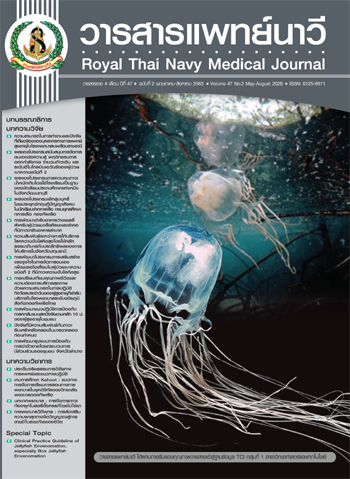Development of Jelly Appetizer Recipe for the Head and Neck Cancer Patients with Dysphagia
Main Article Content
Abstract
This research was a developmental study, the objectives of the research were to develop the jelly appetizer recipe and investigate nutrients values, texture profile analysis, satisfaction to jelly appetizer recipe, the factors related to jelly appetizer recipe among head and neck cancer patients who had dysphagia symptom. Sample sizes were 147 patients who were hospitalized patients in a cancer hospital. Questionnaire was used as main equipment for this project. The data analysis explains frequency, percentage, average, discrepancies in the data comparing to standard and chi-square statistical test. There are seven categories of jelly as follows: (1) stewed pumpkin in coconut milk (2) stewed taro in coconut milk (3) stewed banana in coconut milk (4) sweet tapioca pearls and black beans (5) stewed sweet potato in coconut milk (6) sweet tapioca pearls and cantaloupe melon (7) sweet tapioca pearls and sweetcorn.
The result of nutrition analysis revealed that each flavor of jelly contained high carbohydrates around 126.83 - 149.36 grams and high protein around 1.54 - 3.02 grams. These desserts can be developed to be jelly appetizers for head and neck cancer patients with dysphagia, since flour and dietary fiber are main component. These jellies have been provided to patients in hospitals as breakfast, lunch, and dinner as daily meals for three days. Additionally, the result of satisfaction questionnaire showed that patients felt satisfied with its appetizing appearance, aromatic scent, mellow texture and flavor. It also indicated that gender related to satisfaction in the taste of stewed sweet potato in coconut milk and stewed taro in coconut milk significantly at the level 0.5, and generation also linked to satisfaction in the taste of stewed pumpkin in coconut milk and sweet tapioca pearls and black beans remarkably at the level .05. Therefore, hospitals are recommended to provide these jelly appetizer recipes as daily meals for head and neck cancer patients with dysphagia, therefore, head and neck cancer patients with dysphagia are able to fulfil sufficient nutrition and their quality of life will be improved accordingly.
Article Details

This work is licensed under a Creative Commons Attribution-NonCommercial-NoDerivatives 4.0 International License.
References
Tangjaturonrasme N, Vatanasapt P, Bychkov A. Epidemiology of head and neck cancer in Thailand. Asia PacJ Clin Oncol 2018;14(1):16-22.
Bangkok Hospital. Basic knowledge about cancer. [Internet]. [cited 2018 August 19]. Available form: http://www.phukethospital.com/Thai/Health -Information/Cancer.php#01. (in Thai).
Jamulidrad T. Radiotherapy. [Internet]. [cited 2018 August 19]. Available from: www.bangkokbiznews.com/pr/detail/47138. (in Thai).
National Cancer Institute, Department of Medical Services, Ministry of Public Health. Hospital-Based Cancer Registry. Bangkok: National Cancer Institute, Department of Medical Services; 2018. (in Thai).
Krapoohrit A. Keawkha J, Jongsatitpaiboon J, Powwattana A. Nutrition assessment and nutrition care in head and neck cancer patient by nurse. In: The 15th graduate reaseach conferences; March 28, 2014. Khon Kaen: Graduate School, Khon Kaen University; 2014. p. 1666-74. (in Thai).
Harriet J. Critical weight loss in heard and neck cancer prevalence and risk factors at diagnosis: an exporativestudy. Support Care Cancer 2007;15(9):1045-50.
Musikboonlert P. Treatment of dysphagia. In: The 30th academic conference 2014 “Step into the 43rd year of social dedication”; October 7-9, 2014. Khon Kaen: Faculty of Medicine, Khon Kaen University; 2014. p.16-19. (in Thai).
Watthanaphan P. Assessment of dysphagia. In: The 30th academic conference 2014 “Step into the 43rd year of social dedication”; October 7-9, 2014. Kh on Kaen: Faculty of Medicine, Khon Kaen University; 2014. p.9-12. (in Thai).
Dental Innovation Foundation In the royal patronage. Research and Development of food Innovation Products for Oral Cancer Patients. [Internet]. [cited 2018 August 5]. Available form: http://www.dent-in-found.org/newdesign/research/detail?p=7. (in Thai).
Pichaya P, Putwatana P, Luksanavej L, Feungkorn Suputtra. Effect of honey on oral mucositis and nutrition among patients with head and neck cancer undergoing concurrent radiation and chemotherapy. Thai Cancer Journal 2015;35(3):103-11. (in Thai).
Kosum S. Royal food jelly. [Internet]. [cited 2018 August 5]. Available form: https://www.mahidol.ac.th/th/research_innovation/2556/jelly/jelly.pdf. (in Thai).
Chanchum N. Factors influencing nutritional status of elderly in Bangkhunthian district, Bangkok Metropolitan. [Master’s Thesis, Faculty of Education]. Ramkhamhaeng University; 2016. (in Thai).
Srimanee S, Matwangkun C, Phoomritthikun P, Chancharoen K, Hongkraiert N, Nukul N. Factors related to nutrition consumption behaviors of monks and foodstuff dedication behaviors to the Buddhist monks of people in Pasi Charoen district, Bangkok. Journal of Nursing, Siam University 2018;19(37):22-38. (in Thai).
Chaiyokkia S. Factors affecting food consumption behaviors of adults in Northeastern Thailand. Bangkok: International Health Policy Development Office (IHPP); 2015. (in Thai).
Sisaat B. Preliminary research. 7th edition. Bangkok: Suwiriyasarn; 2002. (in Thai).
Ruamsuk S. Dysphagia. [Internet]. [cited 2018 August 10]. Available from: http://health.haijai.com/3715/. (in Thai).


